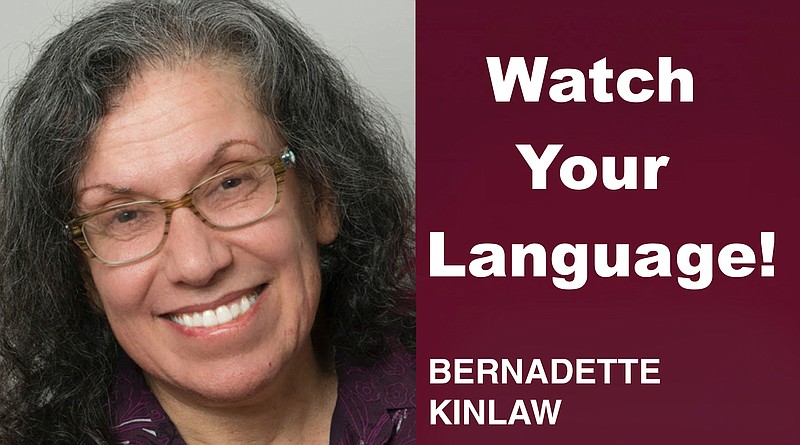I'm always a bit puzzled when I learn that a certain dictionary is adding words that I don't know.
Dictionary.com recently did its regular update of words and phrases. I always zoom in first on the ones I don't know.
First was bio break. This is a trip to a restroom or bathroom, especially a pause for this during a meeting or other group activity.
The phrase came from the world of gambling, which I hear involves hours of unbroken concentration. Still, nature calls. Bio is short for biology.
You might have heard it because this year of the pandemic required numerous Zoom meetings and other video calls for work. Still, are the people in meetings so delicate that they can't handle the phrase “bathroom break”?
Next was deepfake. I am familiar with the concept, but I didn't know what it was called: a fake, digitally manipulated video or audio file produced by using deep learning, an advanced type of machine learning, and typically featuring a person's likeness and voice in a situation that did not actually occur.
I found a disturbing deepfake story recently in The Washington Post. Here's the ominous lead:
"An anonymous cyberbully in Pennsylvania seemed to have one goal in mind: Force a trio of cheerleaders off their formidable local team, the Victory Vipers."
Later in the story:
"The bizarre saga of cyber harassment is notable for the use of deepfake technology and for what Bucks County District Attorney Matthew Weintraub called the 'unlevel playing field.'"
(Spoiler alert: A woman whose daughter was on the team was charged with misdemeanor counts of cyber harassment.)
I think something that's deepfake could just as easily be called fake. Maybe manipulated would be more clear, even though it's a longer word.
And then I learned about "twice exceptional." The entry defines this as relating to or noting a person, especially a child or student, who is considered gifted and also has a diagnosed disability, such as a learner with a high IQ and dyslexia.
I'm not sure what to say about this one. It's jargon. If someone said it, I'd just have to ask for a clarification. Does using the term save time? Will it really become something that's in widespread usage? Am I just being grumpy?
But enough about things I didn't know.
The additions included more timely coronavirus terms. One was "acute respiratory distress syndrome," or ARDS. This is medical jargon, to be sure. Maybe it was added because people hear the initialism and wonder what it means. Also added were variants and strains, names for the variations on covid-19 cases.
The editors added at least two words based on Black vernacular.
This first is finna (fin-uh).
Finna is a phonetic spelling representing the African American Vernacular English variant of "fixing to," a phrase commonly used in Southern U.S. dialects to mark the immediate future while indicating preparation or planning already in progress.
"Oh, no, she finna break his heart!"
Well, I guess I wasn't done with things I didn't know. I had never heard this word before.
But I have heard chile. This isn't a word from the pepper world. This one is pronounced "chahyl." It's a phonetic spelling of child, representing dialectal speech of the Southern United States or African American Vernacular English.
"Oh, chile, you do not want to test me!"
John Kelly, managing editor at Dictionary.com, said this update included a significant change involving the word slave:
"[One] significant decision was to remove the noun slave when referring to people, instead using the adjective enslaved or referring to the institution of slavery. This is part of our ongoing efforts to ensure we represent people on Dictionary.com with due dignity and humanity."
This dictionary's website elaborates on this decision:
"It is painfully clear that referring to enslaved people as slaves has the effect of dehumanizing those subjected to chattel slavery. Use of the noun slave in this way also obscures the responsibility of those who upheld and benefited from such an institution."
Another addition is BIPOC, which stands for "Black, indigenous (and) people of color." Before this, POC was a common initialism for "people of color." The Dictionary.com definition explains the distinction: "Used as a unifying identity label for people of color that also emphasizes the unique racial experiences of Black people and indigenous people."
A couple of entries apply to marginalized communities, the editors said. They define marginalized as placed in a position of little or no importance, influence or power.
An enby is a person who doesn't identify as either male or female. The site says it's a person whose gender identity is nonbinary. The n and b become enby.
Do not confuse this with NB, an abbreviation for the Latin phrase nota bene, or note well.
And neurodivergent means showing atypical neurological behavior and development, as in autism spectrum disorder or dyslexia.
I usually find a word whose mention in the new entries make me laugh.
Dictionary.com decided to add an entry for sourdough.
It's fermented dough retained from one baking and used as leaven, rather than fresh yeast, to start the next.
Baking sourdough bread has become almost a cliché for a hobby that people have been taking up during the pandemic. I can't know whether sourdough has already been in this dictionary. But doesn't it seem like it should have been?
I also learned that sourdough is a nickname for a prospector or pioneer, especially in Alaska or Canada. Supposedly, those people would make and eat sourdough. I wonder whether the Pillsbury Doughboy (whose name is Poppin' Fresh, by the way) had a Canadian cousin named Sourdoughboy.
Sources include Dictionary.com, CNN, Merriam-Webster, The American Heritage Dictionary, Pillsbury. Reach Bernadette at
bkwordmonger@gmail.com
